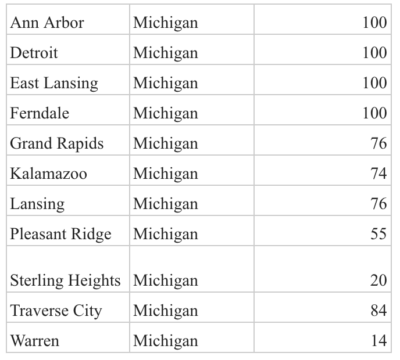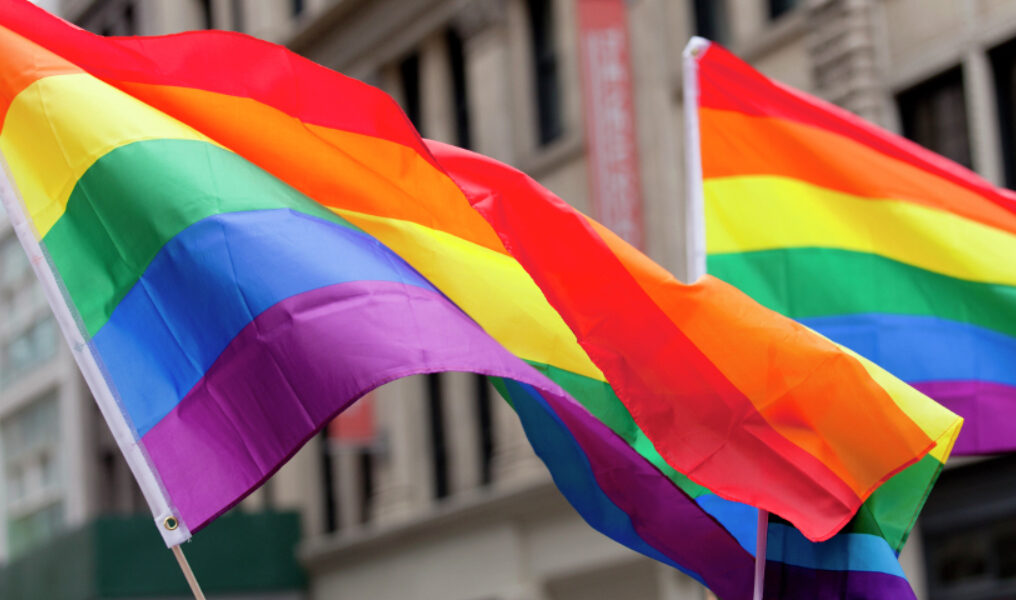Last month the Human Rights Campaign recognized Michigan as high above the national average in its annual Municipal Equality Index. The state earned 73 out of 100 possible points — 15 points higher than the national average of 58. HRC is a national LGBTQ activism organization and releases its Index in an effort to provide a comprehensive breakdown of the LGBTQ-inclusiveness of laws, policies, benefits and services across 506 U.S. cities. These cities are chosen in an effort to fairly represent some of the largest communities of LGBTQ people across the nation.
 Xavier Persad is HRC's Senior Legislative Counsel and the author of this year's MEI Report. He broke down why Michigan's cities were selected for rating.
Xavier Persad is HRC's Senior Legislative Counsel and the author of this year's MEI Report. He broke down why Michigan's cities were selected for rating.
"Fifty state capitals, the 200 largest cities in the country, the five largest cities in each state, 75 cities with high proportions of same-sex couples according to a Williams Institute analysis of the 2010 U.S. Census, the cities that are home to each state's two largest public universities and 98 cities selected by members and supporters of our state LGBTQ equality group partners," Persad said. "So, significant overlap between those criteria results in the cities that we rate for a total of 11 in Michigan."
The MEI counts points for each chosen city via a five-part scorecard that covers these categories: Non-Discrimination Laws, Municipality as Employer, Municipal Services, Law Enforcement and Leadership on LGBTQ Equality. Due to the varying size and population of each selected city, what constitues a perfect 100-point score for one municipality might be significantly different for another. Persad said that this is wholly intentional.
"Our scorecard is structured in a way to allow any city of any size with varying levels of legal authority to score well, even 100 points despite those varying levels of resources and legal authority," he said. "We have 100 points on the scorecard as well as 22 bonus points that reflect things that many cities can do that perhaps all cities cannot do. Or ways that cities are going above and beyond in pushing equality more and what that looks like. So, yes, cities of any size, political background and resources can achieve 100 points."
So, although Michigan does not have existing statewide civil rights laws that cover gender identity or sexual orientation, it hasn't deterred four of its cities — Ann Arbor, Detroit, East Lansing and first-timer Ferndale — from becoming what the MEI ranks as all-stars.
"What we mean by that is that these cities scored extremely well above an 85 despite being located in a state like Michigan where there's no state-level nondiscrimination protections for LGBTQ people," Persad said. "Generally, cities that we rated in Michigan averaged above the national average because of local leadership and in passing comprehensive non-discrimination protections for LGBTQ people that reach housing, employment and public accommodations."
And according to the aggregated scores in the 2018 MEI, this year in general has been a good one for the Great Lakes region. Overall, the area's regional average score was reported to have increased by one point, as well as other positive shifts.
"… Like last year, the highest proportion of 100s to cities rated is the Great Lakes region, with nearly two in three cities securing the MEI's highest score," said the report. "What's more, small and medium-sized cities accounted for about 60 percent of perfect scores."
Ferndale was noted especially in the report this year, too, because it's a "first-time 100-point city and the municipality with the smallest population in the Great Lakes region to obtain this accolade."
However, although eight of the chosen 11 cities in Michigan exceeded the national average, there are three that fell below. For instance, Warren scored the worst at only 14 points because it earned only partial minority credit in the category of Non-Discrimination and half credit in the category of Law Enforcement. The second-worst scorer was Sterling Heights at 20 points. It earned partial minority credit in Non-Discrimination, half credit in Law Enforcement and partial majority credit in the Relationship with LGBTQ Community category. The third-worst city was Pleasant Ridge at 55 points. While the city did earn full credit in its Non-Discrimination category, it only earned half credit in Law enforcement, partial minority credit in the Municipality as Employer category and partial majority credit in its Relationship with the LGBTQ community. Each of the three worst-scoring cities had no bonus points.
But though those cities were below average, Persad emphasized that "this is not a measure of the best places to live for LGBTQ people or lived experience," stating that the MEI is a tool that can be used for city officials to understand what work needs to be done and for citizens to understand their protections in certain areas. Persad said that a high score can also serve as an indirect benefit local industry, too.
"From the work that we've done with our sister index, the Corporate Equality Index, we know that businesses value diversity and inclusion and value enforceable protections that include the LGBTQ community," he said. "So, more and more, we're finding that business leaders are using the Municipal Equality Index as a tool as they consider opening sites or expanding or relocating."
But even beyond the potential fiscal benefit, Persad put it plainly: "Enacting LGBTQ-inclusive protections is just simply the right thing to do."
He added that for those places that would like to improve their given scores, HRC aims to be a resource.
"Cities can reach out to us at MEI at HRC.org with specific requests for assistance or more education on the criteria — what an inclusive law policy looks like," Persad said. "So, we will work with cities hand-in-hand to make sure that they're commitment to LGBTQ equality is reflected in their laws and policies."
A full break down of each city's scores is available online at hrc.org/mei.
Michigan Outscores National Average in HRC Municipal Equality Index










